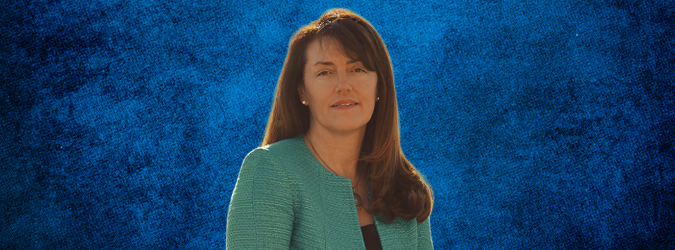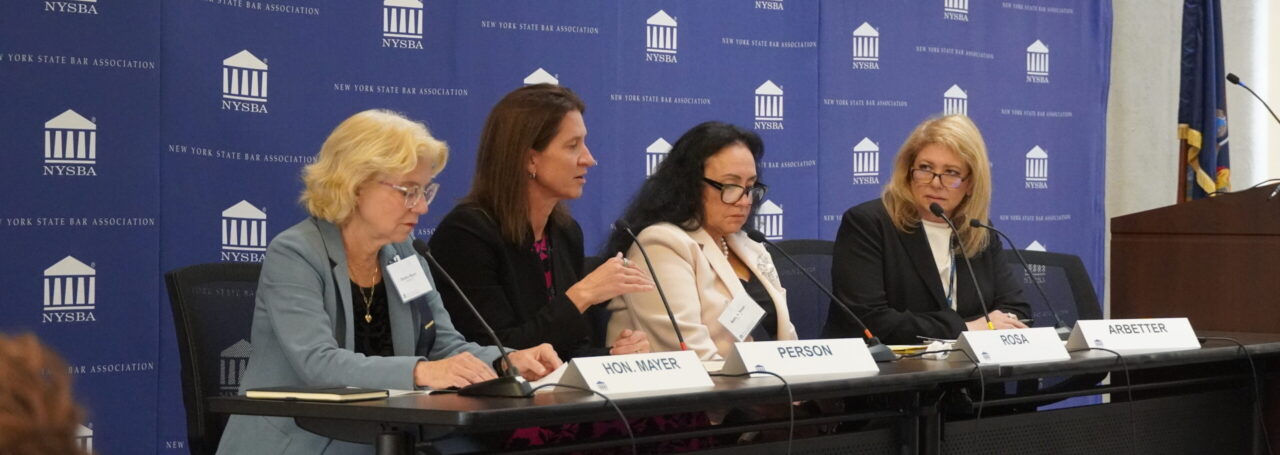President Richard Lewis Delivers Remarks on Freedoms Shared by All Americans During Law Day Celebration at Court of Appeals
5.1.2024
Good morning.
It’s great to be here on behalf of the tens of thousands of New York State Bar Association members.
I am honored to be among today’s distinguished guests including:
- Our Chief Judge Rowan Wilson
- Barbara Underwood, Solicitor General of New York, on behalf of Attorney General Tish James
- And First Deputy Chief Administrative Judge – Norman St. George
I would also like to congratulate all of today’s honorees of the Judith S. Kaye Service Awards, all of whom in their own way quietly represent the greatness of our democracy and the court system that protects it.
It is fitting that our Bar Center stands in the shadows of the Court of Appeals. We both have a noble past – and the respect the New York State Bar Association has for this building and this Court is unmatched. Our buildings symbolize a proud tradition, a noble profession, and a commitment to uphold the law.
Today, we celebrate how the law and the legal process protect the freedoms shared by all Americans.
Our government structure is designed so the people have the means to engage in civil discourse and have their voices heard.
When we listen to all voices and trust each other, we are more likely to solve problems in creative ways that benefit all of us.
We are at a pivotal point as we look toward the 60th presidential election in our nation’s history. Our democracy is being threatened by a growing mistrust among our fellow citizens who doubt the effectiveness of our electoral process.
In addition, the portrayal of partisan politics in the media reverberates beyond our borders. A divided nation struggles to present a united front on national security issues, which impedes our ability to form a consensus on strategic technological investments and negatively impacts economic policies and trade relations.
All this has helped foster an indifferent attitude among our citizens regarding who their elected officials are, especially at the local level where laws that directly impact our everyday lives – from school funding to garbage collection – are developed.
A recent Harvard poll indicates that only 49% of young adults ages 18 to 29 plan to vote in November – a decrease of 8-percentage points from a similar poll taken before the 2020 election. We must address their detachment. We must ensure that elections matter. People — especially young people — need to know that their voices are heard, their votes are valued, and that they can safely cast their ballots.
We need to emphasize that the law touches every aspect of our lives and that we have the power to define our future.
Apathy has not always characterized the prevailing attitude of our youth. When young adults in the 1960’s felt that their opinions were not being heard – their political activism helped spearhead the ratification of the 26th Amendment. But now, ironically, many young people believe their vote does not matter because politicians are not interested in what they have to say.
I often find inspiration in Abraham Lincoln’s closing words of the Gettysburg Address: “…That government of the people – by the people – for the people – shall not perish from this earth.” (We are a government made up by the people and elected by the people to serve the interests of the people.)
We must ask ourselves as citizens: What does that mean to me? How can I shape my community?
Law Day is a time to reflect on these fundamental questions.
However, we cannot merely reflect. The theme of this year’s Law Day is “Voices of Democracy.” We need to use our voices because expressing our opinion is the foundation of our democracy and among the few ways we have as citizens to remove the barriers that impede equal justice. But with that comes great responsibility, and it is not always an easy proposition.
- It takes courage…
- And It takes discipline…
- To not gravitate toward those whose opinions are aligned with our own.
- And to listen – and more importantly learn – from those whose beliefs we may unequivocally oppose.
Overall, we are more alike each other than we are different. We all want many of the same things — safe homes, safe drinking water, safe roads, safe neighborhoods, safe schools and the ability to express our opinion without being drowned out just because it doesn’t coincide with someone else’s.
However, political developments over the past decade have led to the misperception that our differences are so profound we have lost our ability to compromise. The mistrust that has crept into our political discourse has convinced many people that a loss for their side poses a personal threat. This manner of thinking has discouraged people from speaking out and has inhibited our ability to engage in civil debate.
As lawyers, we have a role to play in ensuring and promoting the rule of law, as well as imparting civics knowledge to all citizens. One problem is that young people and adults are not well-informed about civics and do not understand how our government works. This engenders apathy toward the democratic process and voting itself.
We again have a responsibility to encourage Americans to participate in our upcoming elections, to gain a better understanding of electoral proceedings, and to discuss issues in an honest and cordial manner so that our government adheres to the will of its people.
The New York State Bar Association is committed to doing just that.
Our mission is to educate and inform the public and that is why we are hosting an event on this very topic on May 9th. We aim to ensure New Yorkers understand what the U.S. Constitution guarantees, why the history of our democracy is important and how it all works.
Chief Judge Wilson will be our keynote speaker while U.S. Supreme Court Associate Justice Sonia Sotomayor will deliver virtual remarks to an audience at the Bar Center. She will also answer questions from students. Such a rare opportunity will undoubtedly spark their interest in the democratic process.
Greater youth involvement in politics and elections will be a benefit to us all. It will literally pay off for decades to come. A study from Yale University indicates that voting is habit-forming – meaning that people who are encouraged to vote in this election are more likely to vote in future elections.
It is, therefore, imperative that we advocate for our youth and for the future of our democracy.
We do that by promoting a civil exchange of ideas to ensure that their voices – and our voices – are heard.
Thank you.






